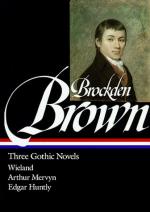|
This section contains 9,136 words (approx. 31 pages at 300 words per page) |

|
SOURCE: "'The Double-Tongued Deceiver': Sincerity and Duplicity in the Novels of Charles Brockden Brown," in Early American Literature, Vol. IX, No. 2, Fall, 1974, pp. 143-63.
In the following essay, Bell addresses the "dialectic between innocence and experience " in Brown 's novels, maintaining that in novels such as Wieland, Brown explores the conflict between Lockean-style rationalism and the irrational forces of the imagination. Bell further claims that this struggle has philosophical, political, psychological, and literary dimensions.
The four best-known novels of Charles Brockden Brown turn on a contest between two recurring figures: a virtuous but inexperienced protagonist (Clara Wieland, Constantia Dudley, Edgar Huntly, Arthur Mervyn) and an antagonist (Carwin, Ormond, Clithero Edny, Welbeck) whose attitudes and experience threaten the protagonist's conception of virtue and order. At the center of these novels is a dialectic between innocence and experience or, to use the terms Brown himself preferred, between "sincerity" and "duplicity...
|
This section contains 9,136 words (approx. 31 pages at 300 words per page) |

|


